Business Law: Directors' Duties and Limited Liability
VerifiedAdded on 2023/06/13
|15
|3792
|282
AI Summary
This article discusses directors' duties and limited liability in business law. It explains the consequences of breach of duties by directors and the principles of limited liability. It also highlights the situations where limited liability may not apply.
Contribute Materials
Your contribution can guide someone’s learning journey. Share your
documents today.
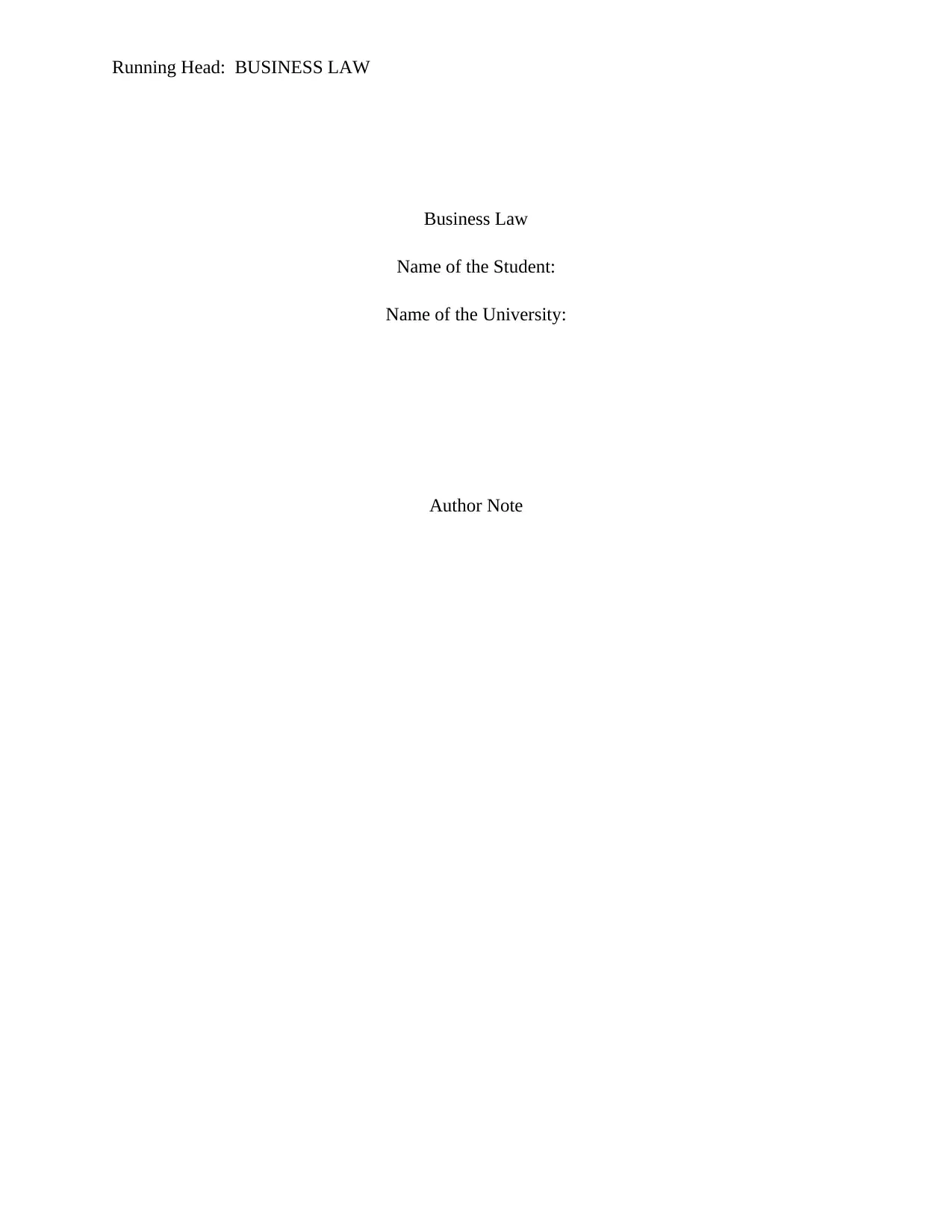
Running Head: BUSINESS LAW
Business Law
Name of the Student:
Name of the University:
Author Note
Business Law
Name of the Student:
Name of the University:
Author Note
Secure Best Marks with AI Grader
Need help grading? Try our AI Grader for instant feedback on your assignments.
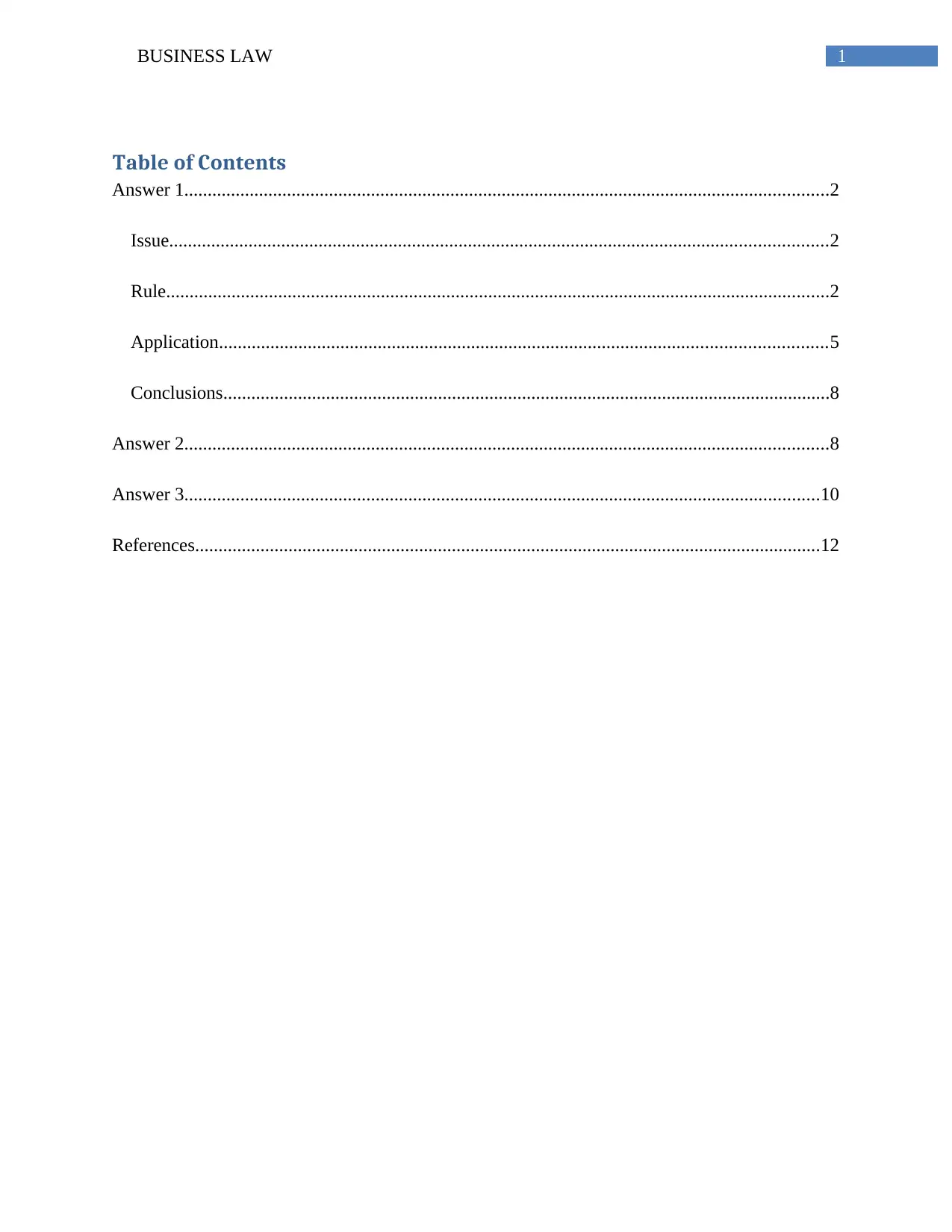
1BUSINESS LAW
Table of Contents
Answer 1..........................................................................................................................................2
Issue.............................................................................................................................................2
Rule..............................................................................................................................................2
Application..................................................................................................................................5
Conclusions..................................................................................................................................8
Answer 2..........................................................................................................................................8
Answer 3........................................................................................................................................10
References......................................................................................................................................12
Table of Contents
Answer 1..........................................................................................................................................2
Issue.............................................................................................................................................2
Rule..............................................................................................................................................2
Application..................................................................................................................................5
Conclusions..................................................................................................................................8
Answer 2..........................................................................................................................................8
Answer 3........................................................................................................................................10
References......................................................................................................................................12
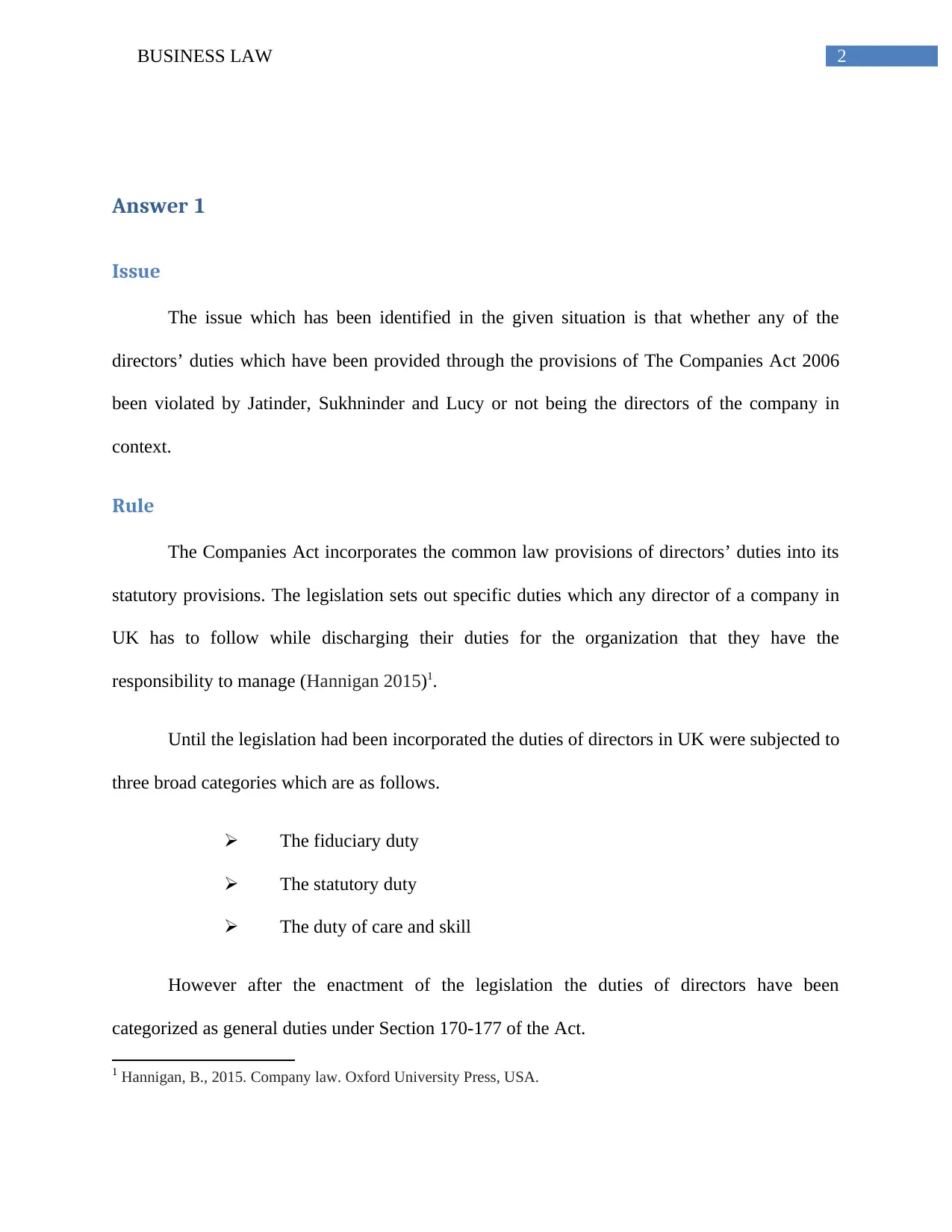
2BUSINESS LAW
Answer 1
Issue
The issue which has been identified in the given situation is that whether any of the
directors’ duties which have been provided through the provisions of The Companies Act 2006
been violated by Jatinder, Sukhninder and Lucy or not being the directors of the company in
context.
Rule
The Companies Act incorporates the common law provisions of directors’ duties into its
statutory provisions. The legislation sets out specific duties which any director of a company in
UK has to follow while discharging their duties for the organization that they have the
responsibility to manage (Hannigan 2015)1.
Until the legislation had been incorporated the duties of directors in UK were subjected to
three broad categories which are as follows.
The fiduciary duty
The statutory duty
The duty of care and skill
However after the enactment of the legislation the duties of directors have been
categorized as general duties under Section 170-177 of the Act.
1 Hannigan, B., 2015. Company law. Oxford University Press, USA.
Answer 1
Issue
The issue which has been identified in the given situation is that whether any of the
directors’ duties which have been provided through the provisions of The Companies Act 2006
been violated by Jatinder, Sukhninder and Lucy or not being the directors of the company in
context.
Rule
The Companies Act incorporates the common law provisions of directors’ duties into its
statutory provisions. The legislation sets out specific duties which any director of a company in
UK has to follow while discharging their duties for the organization that they have the
responsibility to manage (Hannigan 2015)1.
Until the legislation had been incorporated the duties of directors in UK were subjected to
three broad categories which are as follows.
The fiduciary duty
The statutory duty
The duty of care and skill
However after the enactment of the legislation the duties of directors have been
categorized as general duties under Section 170-177 of the Act.
1 Hannigan, B., 2015. Company law. Oxford University Press, USA.
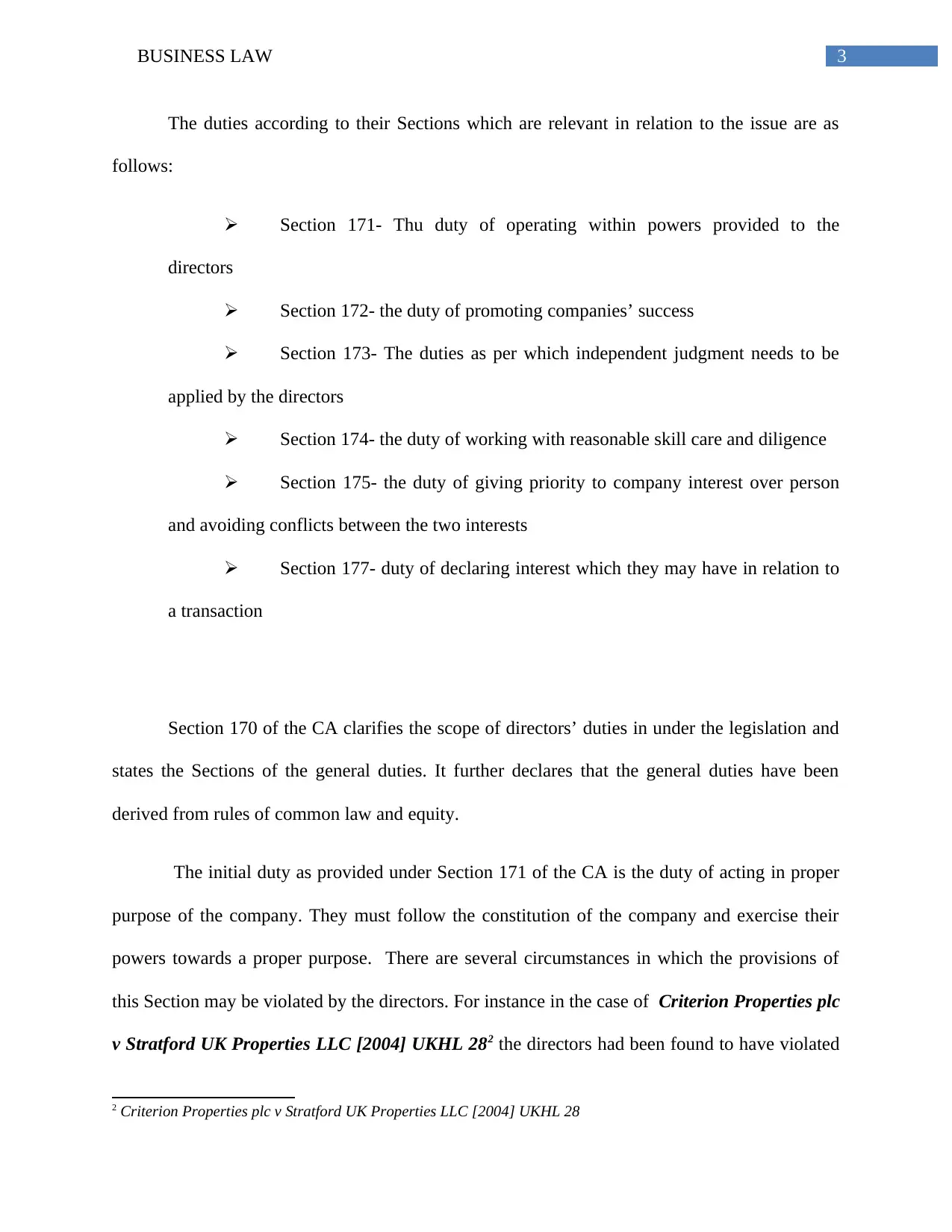
3BUSINESS LAW
The duties according to their Sections which are relevant in relation to the issue are as
follows:
Section 171- Thu duty of operating within powers provided to the
directors
Section 172- the duty of promoting companies’ success
Section 173- The duties as per which independent judgment needs to be
applied by the directors
Section 174- the duty of working with reasonable skill care and diligence
Section 175- the duty of giving priority to company interest over person
and avoiding conflicts between the two interests
Section 177- duty of declaring interest which they may have in relation to
a transaction
Section 170 of the CA clarifies the scope of directors’ duties in under the legislation and
states the Sections of the general duties. It further declares that the general duties have been
derived from rules of common law and equity.
The initial duty as provided under Section 171 of the CA is the duty of acting in proper
purpose of the company. They must follow the constitution of the company and exercise their
powers towards a proper purpose. There are several circumstances in which the provisions of
this Section may be violated by the directors. For instance in the case of Criterion Properties plc
v Stratford UK Properties LLC [2004] UKHL 282 the directors had been found to have violated
2 Criterion Properties plc v Stratford UK Properties LLC [2004] UKHL 28
The duties according to their Sections which are relevant in relation to the issue are as
follows:
Section 171- Thu duty of operating within powers provided to the
directors
Section 172- the duty of promoting companies’ success
Section 173- The duties as per which independent judgment needs to be
applied by the directors
Section 174- the duty of working with reasonable skill care and diligence
Section 175- the duty of giving priority to company interest over person
and avoiding conflicts between the two interests
Section 177- duty of declaring interest which they may have in relation to
a transaction
Section 170 of the CA clarifies the scope of directors’ duties in under the legislation and
states the Sections of the general duties. It further declares that the general duties have been
derived from rules of common law and equity.
The initial duty as provided under Section 171 of the CA is the duty of acting in proper
purpose of the company. They must follow the constitution of the company and exercise their
powers towards a proper purpose. There are several circumstances in which the provisions of
this Section may be violated by the directors. For instance in the case of Criterion Properties plc
v Stratford UK Properties LLC [2004] UKHL 282 the directors had been found to have violated
2 Criterion Properties plc v Stratford UK Properties LLC [2004] UKHL 28
Secure Best Marks with AI Grader
Need help grading? Try our AI Grader for instant feedback on your assignments.
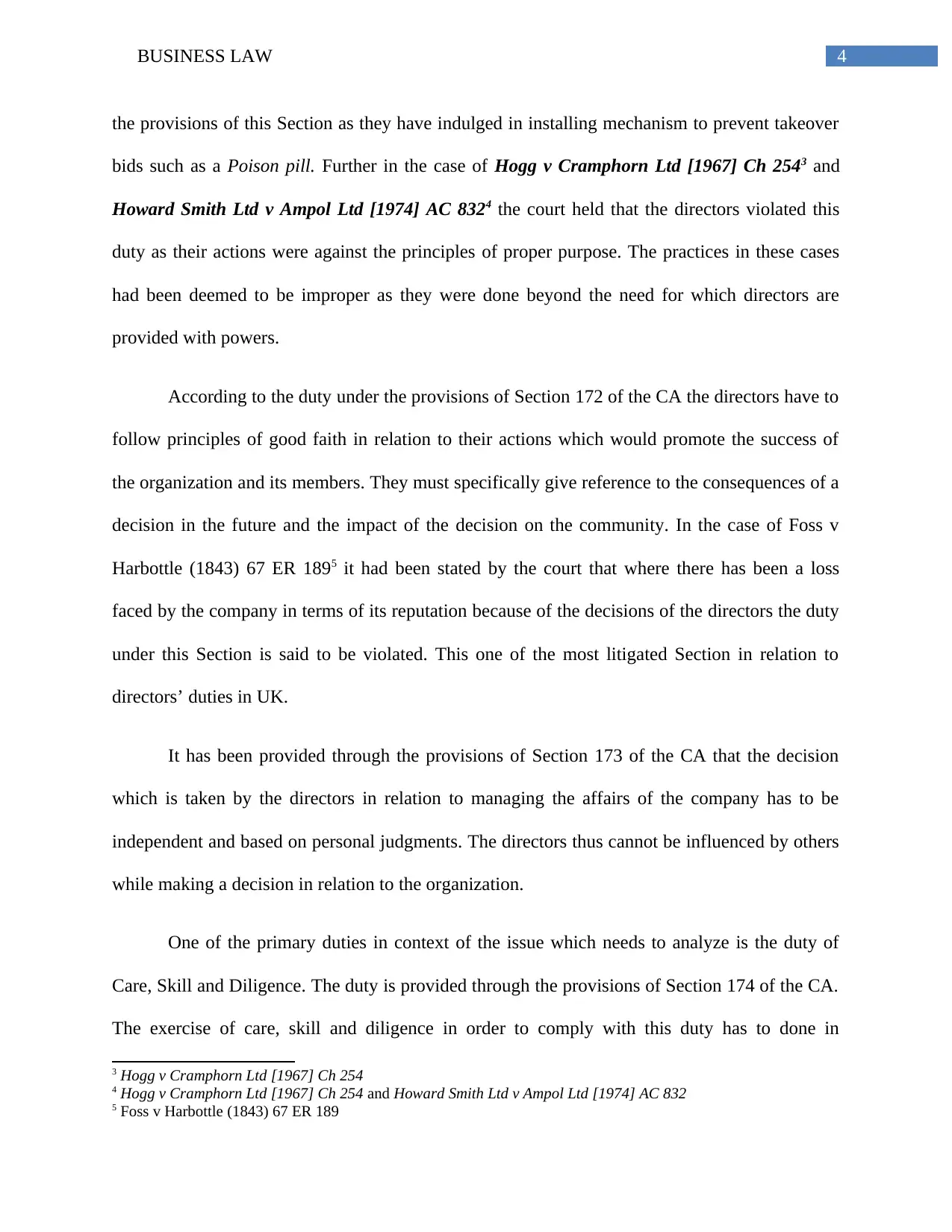
4BUSINESS LAW
the provisions of this Section as they have indulged in installing mechanism to prevent takeover
bids such as a Poison pill. Further in the case of Hogg v Cramphorn Ltd [1967] Ch 2543 and
Howard Smith Ltd v Ampol Ltd [1974] AC 8324 the court held that the directors violated this
duty as their actions were against the principles of proper purpose. The practices in these cases
had been deemed to be improper as they were done beyond the need for which directors are
provided with powers.
According to the duty under the provisions of Section 172 of the CA the directors have to
follow principles of good faith in relation to their actions which would promote the success of
the organization and its members. They must specifically give reference to the consequences of a
decision in the future and the impact of the decision on the community. In the case of Foss v
Harbottle (1843) 67 ER 1895 it had been stated by the court that where there has been a loss
faced by the company in terms of its reputation because of the decisions of the directors the duty
under this Section is said to be violated. This one of the most litigated Section in relation to
directors’ duties in UK.
It has been provided through the provisions of Section 173 of the CA that the decision
which is taken by the directors in relation to managing the affairs of the company has to be
independent and based on personal judgments. The directors thus cannot be influenced by others
while making a decision in relation to the organization.
One of the primary duties in context of the issue which needs to analyze is the duty of
Care, Skill and Diligence. The duty is provided through the provisions of Section 174 of the CA.
The exercise of care, skill and diligence in order to comply with this duty has to done in
3 Hogg v Cramphorn Ltd [1967] Ch 254
4 Hogg v Cramphorn Ltd [1967] Ch 254 and Howard Smith Ltd v Ampol Ltd [1974] AC 832
5 Foss v Harbottle (1843) 67 ER 189
the provisions of this Section as they have indulged in installing mechanism to prevent takeover
bids such as a Poison pill. Further in the case of Hogg v Cramphorn Ltd [1967] Ch 2543 and
Howard Smith Ltd v Ampol Ltd [1974] AC 8324 the court held that the directors violated this
duty as their actions were against the principles of proper purpose. The practices in these cases
had been deemed to be improper as they were done beyond the need for which directors are
provided with powers.
According to the duty under the provisions of Section 172 of the CA the directors have to
follow principles of good faith in relation to their actions which would promote the success of
the organization and its members. They must specifically give reference to the consequences of a
decision in the future and the impact of the decision on the community. In the case of Foss v
Harbottle (1843) 67 ER 1895 it had been stated by the court that where there has been a loss
faced by the company in terms of its reputation because of the decisions of the directors the duty
under this Section is said to be violated. This one of the most litigated Section in relation to
directors’ duties in UK.
It has been provided through the provisions of Section 173 of the CA that the decision
which is taken by the directors in relation to managing the affairs of the company has to be
independent and based on personal judgments. The directors thus cannot be influenced by others
while making a decision in relation to the organization.
One of the primary duties in context of the issue which needs to analyze is the duty of
Care, Skill and Diligence. The duty is provided through the provisions of Section 174 of the CA.
The exercise of care, skill and diligence in order to comply with this duty has to done in
3 Hogg v Cramphorn Ltd [1967] Ch 254
4 Hogg v Cramphorn Ltd [1967] Ch 254 and Howard Smith Ltd v Ampol Ltd [1974] AC 832
5 Foss v Harbottle (1843) 67 ER 189
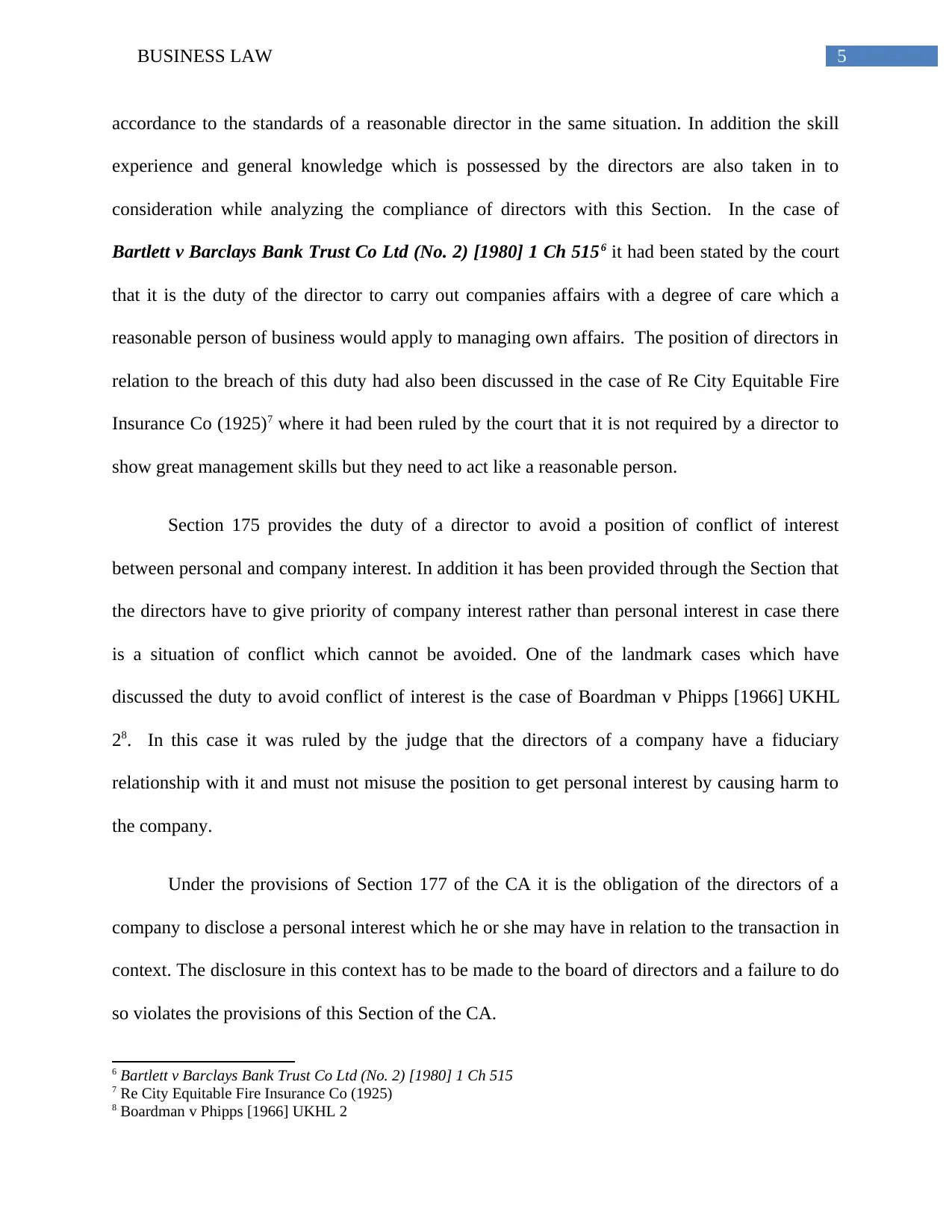
5BUSINESS LAW
accordance to the standards of a reasonable director in the same situation. In addition the skill
experience and general knowledge which is possessed by the directors are also taken in to
consideration while analyzing the compliance of directors with this Section. In the case of
Bartlett v Barclays Bank Trust Co Ltd (No. 2) [1980] 1 Ch 5156 it had been stated by the court
that it is the duty of the director to carry out companies affairs with a degree of care which a
reasonable person of business would apply to managing own affairs. The position of directors in
relation to the breach of this duty had also been discussed in the case of Re City Equitable Fire
Insurance Co (1925)7 where it had been ruled by the court that it is not required by a director to
show great management skills but they need to act like a reasonable person.
Section 175 provides the duty of a director to avoid a position of conflict of interest
between personal and company interest. In addition it has been provided through the Section that
the directors have to give priority of company interest rather than personal interest in case there
is a situation of conflict which cannot be avoided. One of the landmark cases which have
discussed the duty to avoid conflict of interest is the case of Boardman v Phipps [1966] UKHL
28. In this case it was ruled by the judge that the directors of a company have a fiduciary
relationship with it and must not misuse the position to get personal interest by causing harm to
the company.
Under the provisions of Section 177 of the CA it is the obligation of the directors of a
company to disclose a personal interest which he or she may have in relation to the transaction in
context. The disclosure in this context has to be made to the board of directors and a failure to do
so violates the provisions of this Section of the CA.
6 Bartlett v Barclays Bank Trust Co Ltd (No. 2) [1980] 1 Ch 515
7 Re City Equitable Fire Insurance Co (1925)
8 Boardman v Phipps [1966] UKHL 2
accordance to the standards of a reasonable director in the same situation. In addition the skill
experience and general knowledge which is possessed by the directors are also taken in to
consideration while analyzing the compliance of directors with this Section. In the case of
Bartlett v Barclays Bank Trust Co Ltd (No. 2) [1980] 1 Ch 5156 it had been stated by the court
that it is the duty of the director to carry out companies affairs with a degree of care which a
reasonable person of business would apply to managing own affairs. The position of directors in
relation to the breach of this duty had also been discussed in the case of Re City Equitable Fire
Insurance Co (1925)7 where it had been ruled by the court that it is not required by a director to
show great management skills but they need to act like a reasonable person.
Section 175 provides the duty of a director to avoid a position of conflict of interest
between personal and company interest. In addition it has been provided through the Section that
the directors have to give priority of company interest rather than personal interest in case there
is a situation of conflict which cannot be avoided. One of the landmark cases which have
discussed the duty to avoid conflict of interest is the case of Boardman v Phipps [1966] UKHL
28. In this case it was ruled by the judge that the directors of a company have a fiduciary
relationship with it and must not misuse the position to get personal interest by causing harm to
the company.
Under the provisions of Section 177 of the CA it is the obligation of the directors of a
company to disclose a personal interest which he or she may have in relation to the transaction in
context. The disclosure in this context has to be made to the board of directors and a failure to do
so violates the provisions of this Section of the CA.
6 Bartlett v Barclays Bank Trust Co Ltd (No. 2) [1980] 1 Ch 515
7 Re City Equitable Fire Insurance Co (1925)
8 Boardman v Phipps [1966] UKHL 2
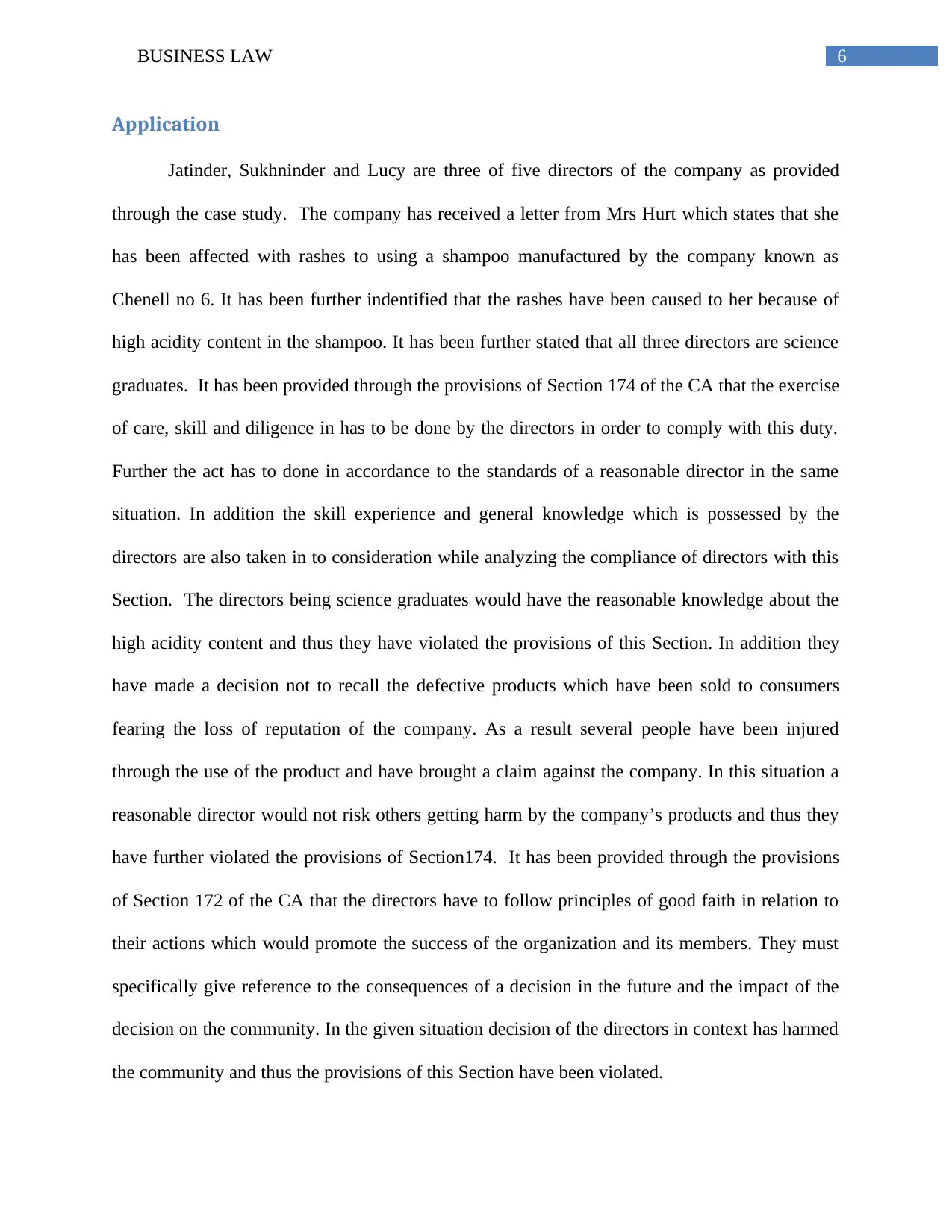
6BUSINESS LAW
Application
Jatinder, Sukhninder and Lucy are three of five directors of the company as provided
through the case study. The company has received a letter from Mrs Hurt which states that she
has been affected with rashes to using a shampoo manufactured by the company known as
Chenell no 6. It has been further indentified that the rashes have been caused to her because of
high acidity content in the shampoo. It has been further stated that all three directors are science
graduates. It has been provided through the provisions of Section 174 of the CA that the exercise
of care, skill and diligence in has to be done by the directors in order to comply with this duty.
Further the act has to done in accordance to the standards of a reasonable director in the same
situation. In addition the skill experience and general knowledge which is possessed by the
directors are also taken in to consideration while analyzing the compliance of directors with this
Section. The directors being science graduates would have the reasonable knowledge about the
high acidity content and thus they have violated the provisions of this Section. In addition they
have made a decision not to recall the defective products which have been sold to consumers
fearing the loss of reputation of the company. As a result several people have been injured
through the use of the product and have brought a claim against the company. In this situation a
reasonable director would not risk others getting harm by the company’s products and thus they
have further violated the provisions of Section174. It has been provided through the provisions
of Section 172 of the CA that the directors have to follow principles of good faith in relation to
their actions which would promote the success of the organization and its members. They must
specifically give reference to the consequences of a decision in the future and the impact of the
decision on the community. In the given situation decision of the directors in context has harmed
the community and thus the provisions of this Section have been violated.
Application
Jatinder, Sukhninder and Lucy are three of five directors of the company as provided
through the case study. The company has received a letter from Mrs Hurt which states that she
has been affected with rashes to using a shampoo manufactured by the company known as
Chenell no 6. It has been further indentified that the rashes have been caused to her because of
high acidity content in the shampoo. It has been further stated that all three directors are science
graduates. It has been provided through the provisions of Section 174 of the CA that the exercise
of care, skill and diligence in has to be done by the directors in order to comply with this duty.
Further the act has to done in accordance to the standards of a reasonable director in the same
situation. In addition the skill experience and general knowledge which is possessed by the
directors are also taken in to consideration while analyzing the compliance of directors with this
Section. The directors being science graduates would have the reasonable knowledge about the
high acidity content and thus they have violated the provisions of this Section. In addition they
have made a decision not to recall the defective products which have been sold to consumers
fearing the loss of reputation of the company. As a result several people have been injured
through the use of the product and have brought a claim against the company. In this situation a
reasonable director would not risk others getting harm by the company’s products and thus they
have further violated the provisions of Section174. It has been provided through the provisions
of Section 172 of the CA that the directors have to follow principles of good faith in relation to
their actions which would promote the success of the organization and its members. They must
specifically give reference to the consequences of a decision in the future and the impact of the
decision on the community. In the given situation decision of the directors in context has harmed
the community and thus the provisions of this Section have been violated.
Paraphrase This Document
Need a fresh take? Get an instant paraphrase of this document with our AI Paraphraser
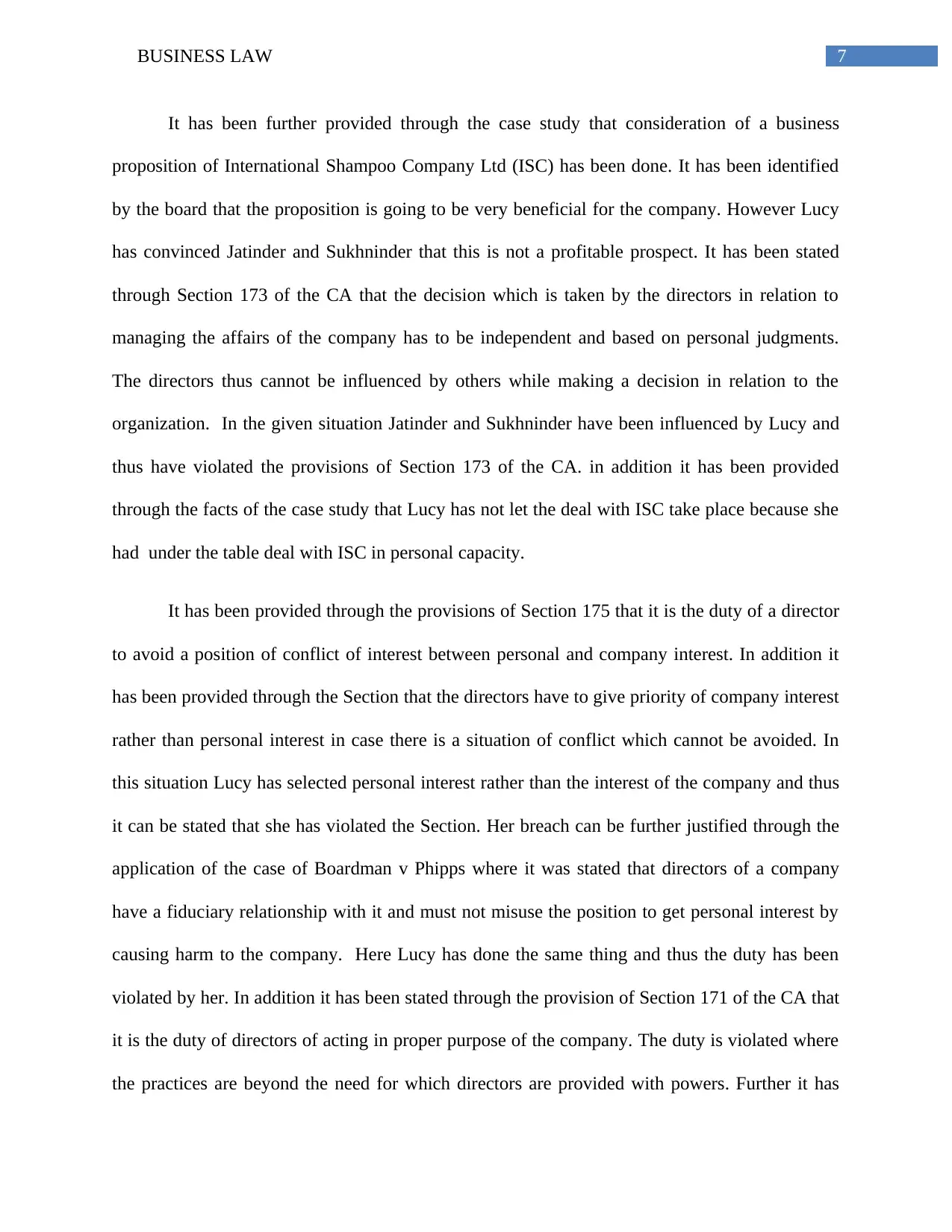
7BUSINESS LAW
It has been further provided through the case study that consideration of a business
proposition of International Shampoo Company Ltd (ISC) has been done. It has been identified
by the board that the proposition is going to be very beneficial for the company. However Lucy
has convinced Jatinder and Sukhninder that this is not a profitable prospect. It has been stated
through Section 173 of the CA that the decision which is taken by the directors in relation to
managing the affairs of the company has to be independent and based on personal judgments.
The directors thus cannot be influenced by others while making a decision in relation to the
organization. In the given situation Jatinder and Sukhninder have been influenced by Lucy and
thus have violated the provisions of Section 173 of the CA. in addition it has been provided
through the facts of the case study that Lucy has not let the deal with ISC take place because she
had under the table deal with ISC in personal capacity.
It has been provided through the provisions of Section 175 that it is the duty of a director
to avoid a position of conflict of interest between personal and company interest. In addition it
has been provided through the Section that the directors have to give priority of company interest
rather than personal interest in case there is a situation of conflict which cannot be avoided. In
this situation Lucy has selected personal interest rather than the interest of the company and thus
it can be stated that she has violated the Section. Her breach can be further justified through the
application of the case of Boardman v Phipps where it was stated that directors of a company
have a fiduciary relationship with it and must not misuse the position to get personal interest by
causing harm to the company. Here Lucy has done the same thing and thus the duty has been
violated by her. In addition it has been stated through the provision of Section 171 of the CA that
it is the duty of directors of acting in proper purpose of the company. The duty is violated where
the practices are beyond the need for which directors are provided with powers. Further it has
It has been further provided through the case study that consideration of a business
proposition of International Shampoo Company Ltd (ISC) has been done. It has been identified
by the board that the proposition is going to be very beneficial for the company. However Lucy
has convinced Jatinder and Sukhninder that this is not a profitable prospect. It has been stated
through Section 173 of the CA that the decision which is taken by the directors in relation to
managing the affairs of the company has to be independent and based on personal judgments.
The directors thus cannot be influenced by others while making a decision in relation to the
organization. In the given situation Jatinder and Sukhninder have been influenced by Lucy and
thus have violated the provisions of Section 173 of the CA. in addition it has been provided
through the facts of the case study that Lucy has not let the deal with ISC take place because she
had under the table deal with ISC in personal capacity.
It has been provided through the provisions of Section 175 that it is the duty of a director
to avoid a position of conflict of interest between personal and company interest. In addition it
has been provided through the Section that the directors have to give priority of company interest
rather than personal interest in case there is a situation of conflict which cannot be avoided. In
this situation Lucy has selected personal interest rather than the interest of the company and thus
it can be stated that she has violated the Section. Her breach can be further justified through the
application of the case of Boardman v Phipps where it was stated that directors of a company
have a fiduciary relationship with it and must not misuse the position to get personal interest by
causing harm to the company. Here Lucy has done the same thing and thus the duty has been
violated by her. In addition it has been stated through the provision of Section 171 of the CA that
it is the duty of directors of acting in proper purpose of the company. The duty is violated where
the practices are beyond the need for which directors are provided with powers. Further it has
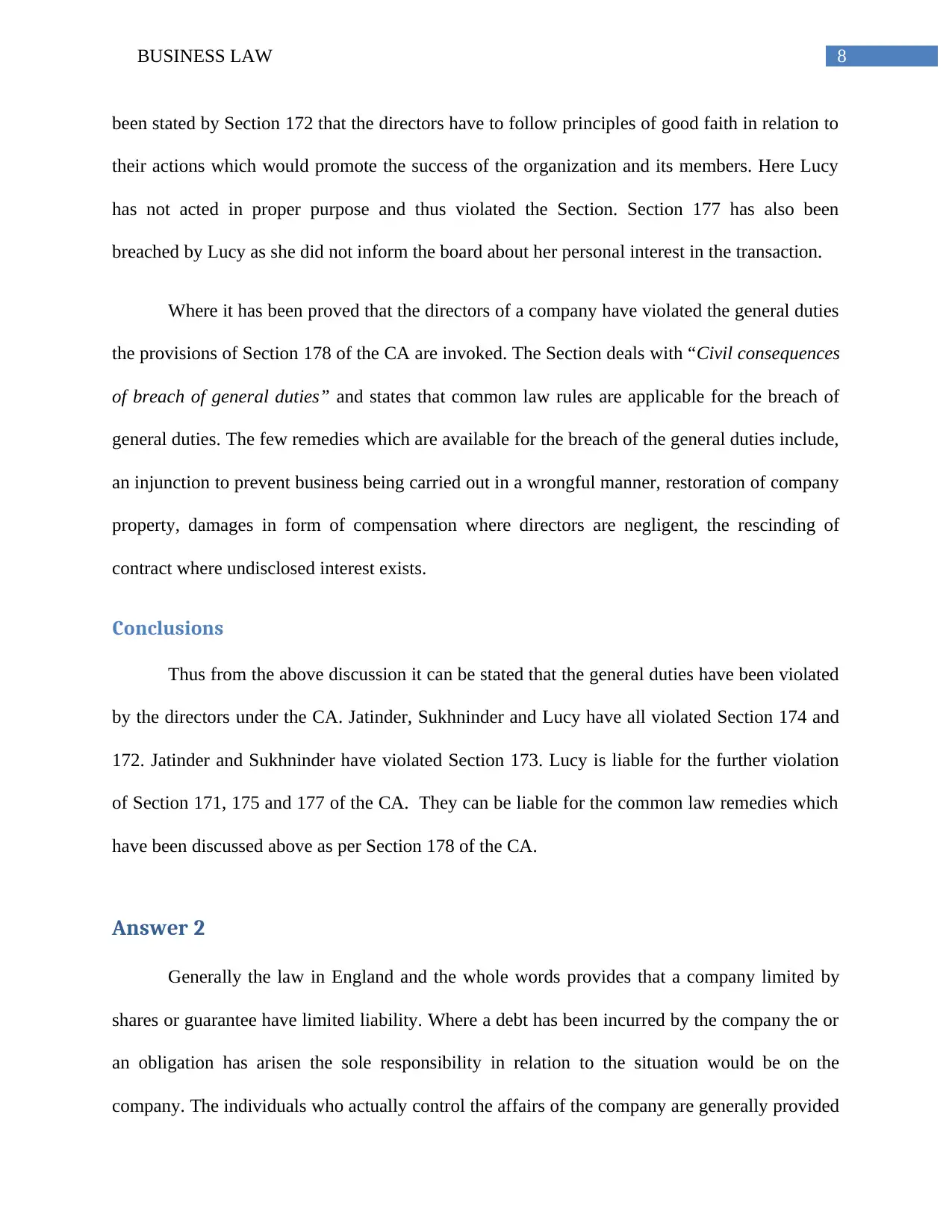
8BUSINESS LAW
been stated by Section 172 that the directors have to follow principles of good faith in relation to
their actions which would promote the success of the organization and its members. Here Lucy
has not acted in proper purpose and thus violated the Section. Section 177 has also been
breached by Lucy as she did not inform the board about her personal interest in the transaction.
Where it has been proved that the directors of a company have violated the general duties
the provisions of Section 178 of the CA are invoked. The Section deals with “Civil consequences
of breach of general duties” and states that common law rules are applicable for the breach of
general duties. The few remedies which are available for the breach of the general duties include,
an injunction to prevent business being carried out in a wrongful manner, restoration of company
property, damages in form of compensation where directors are negligent, the rescinding of
contract where undisclosed interest exists.
Conclusions
Thus from the above discussion it can be stated that the general duties have been violated
by the directors under the CA. Jatinder, Sukhninder and Lucy have all violated Section 174 and
172. Jatinder and Sukhninder have violated Section 173. Lucy is liable for the further violation
of Section 171, 175 and 177 of the CA. They can be liable for the common law remedies which
have been discussed above as per Section 178 of the CA.
Answer 2
Generally the law in England and the whole words provides that a company limited by
shares or guarantee have limited liability. Where a debt has been incurred by the company the or
an obligation has arisen the sole responsibility in relation to the situation would be on the
company. The individuals who actually control the affairs of the company are generally provided
been stated by Section 172 that the directors have to follow principles of good faith in relation to
their actions which would promote the success of the organization and its members. Here Lucy
has not acted in proper purpose and thus violated the Section. Section 177 has also been
breached by Lucy as she did not inform the board about her personal interest in the transaction.
Where it has been proved that the directors of a company have violated the general duties
the provisions of Section 178 of the CA are invoked. The Section deals with “Civil consequences
of breach of general duties” and states that common law rules are applicable for the breach of
general duties. The few remedies which are available for the breach of the general duties include,
an injunction to prevent business being carried out in a wrongful manner, restoration of company
property, damages in form of compensation where directors are negligent, the rescinding of
contract where undisclosed interest exists.
Conclusions
Thus from the above discussion it can be stated that the general duties have been violated
by the directors under the CA. Jatinder, Sukhninder and Lucy have all violated Section 174 and
172. Jatinder and Sukhninder have violated Section 173. Lucy is liable for the further violation
of Section 171, 175 and 177 of the CA. They can be liable for the common law remedies which
have been discussed above as per Section 178 of the CA.
Answer 2
Generally the law in England and the whole words provides that a company limited by
shares or guarantee have limited liability. Where a debt has been incurred by the company the or
an obligation has arisen the sole responsibility in relation to the situation would be on the
company. The individuals who actually control the affairs of the company are generally provided
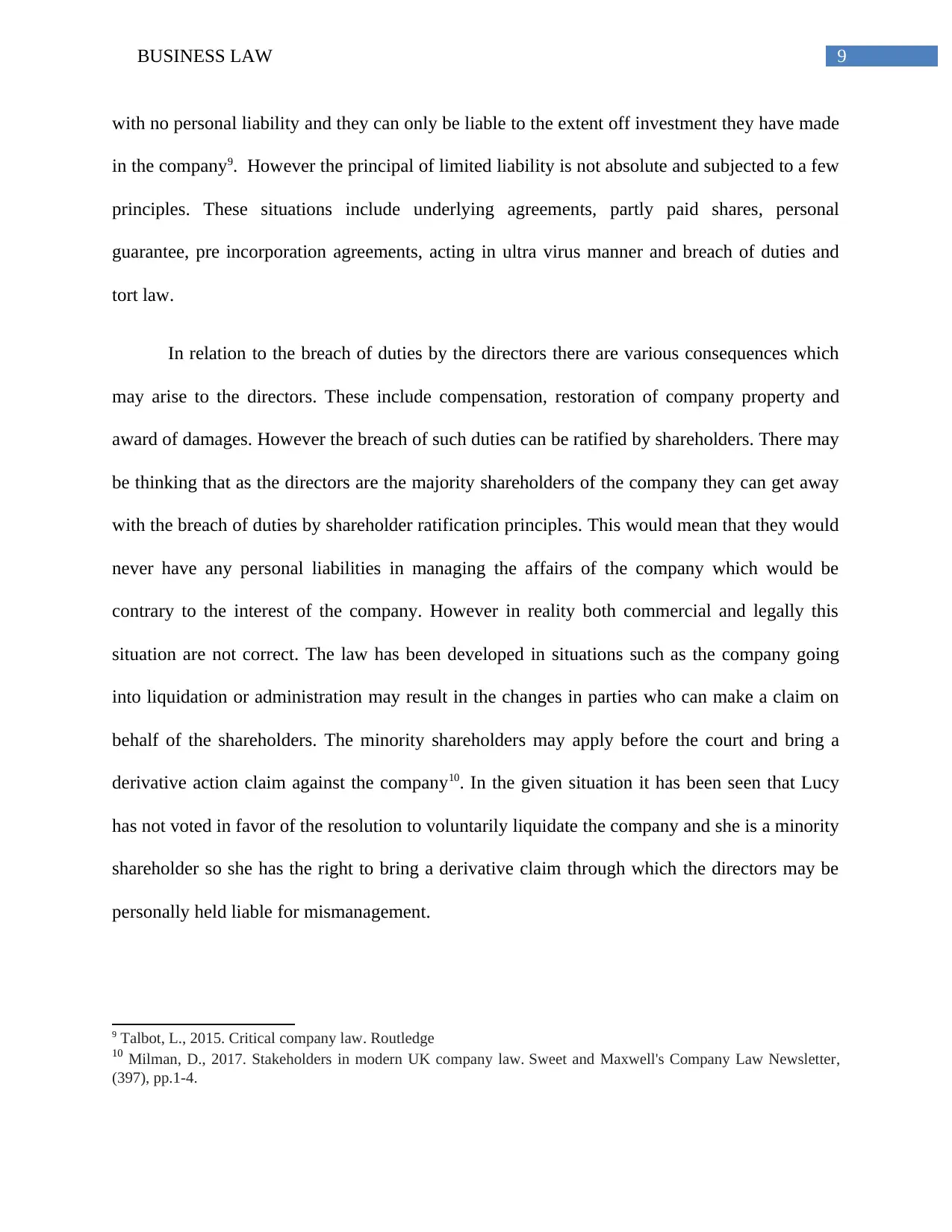
9BUSINESS LAW
with no personal liability and they can only be liable to the extent off investment they have made
in the company9. However the principal of limited liability is not absolute and subjected to a few
principles. These situations include underlying agreements, partly paid shares, personal
guarantee, pre incorporation agreements, acting in ultra virus manner and breach of duties and
tort law.
In relation to the breach of duties by the directors there are various consequences which
may arise to the directors. These include compensation, restoration of company property and
award of damages. However the breach of such duties can be ratified by shareholders. There may
be thinking that as the directors are the majority shareholders of the company they can get away
with the breach of duties by shareholder ratification principles. This would mean that they would
never have any personal liabilities in managing the affairs of the company which would be
contrary to the interest of the company. However in reality both commercial and legally this
situation are not correct. The law has been developed in situations such as the company going
into liquidation or administration may result in the changes in parties who can make a claim on
behalf of the shareholders. The minority shareholders may apply before the court and bring a
derivative action claim against the company10. In the given situation it has been seen that Lucy
has not voted in favor of the resolution to voluntarily liquidate the company and she is a minority
shareholder so she has the right to bring a derivative claim through which the directors may be
personally held liable for mismanagement.
9 Talbot, L., 2015. Critical company law. Routledge
10 Milman, D., 2017. Stakeholders in modern UK company law. Sweet and Maxwell's Company Law Newsletter,
(397), pp.1-4.
with no personal liability and they can only be liable to the extent off investment they have made
in the company9. However the principal of limited liability is not absolute and subjected to a few
principles. These situations include underlying agreements, partly paid shares, personal
guarantee, pre incorporation agreements, acting in ultra virus manner and breach of duties and
tort law.
In relation to the breach of duties by the directors there are various consequences which
may arise to the directors. These include compensation, restoration of company property and
award of damages. However the breach of such duties can be ratified by shareholders. There may
be thinking that as the directors are the majority shareholders of the company they can get away
with the breach of duties by shareholder ratification principles. This would mean that they would
never have any personal liabilities in managing the affairs of the company which would be
contrary to the interest of the company. However in reality both commercial and legally this
situation are not correct. The law has been developed in situations such as the company going
into liquidation or administration may result in the changes in parties who can make a claim on
behalf of the shareholders. The minority shareholders may apply before the court and bring a
derivative action claim against the company10. In the given situation it has been seen that Lucy
has not voted in favor of the resolution to voluntarily liquidate the company and she is a minority
shareholder so she has the right to bring a derivative claim through which the directors may be
personally held liable for mismanagement.
9 Talbot, L., 2015. Critical company law. Routledge
10 Milman, D., 2017. Stakeholders in modern UK company law. Sweet and Maxwell's Company Law Newsletter,
(397), pp.1-4.
Secure Best Marks with AI Grader
Need help grading? Try our AI Grader for instant feedback on your assignments.
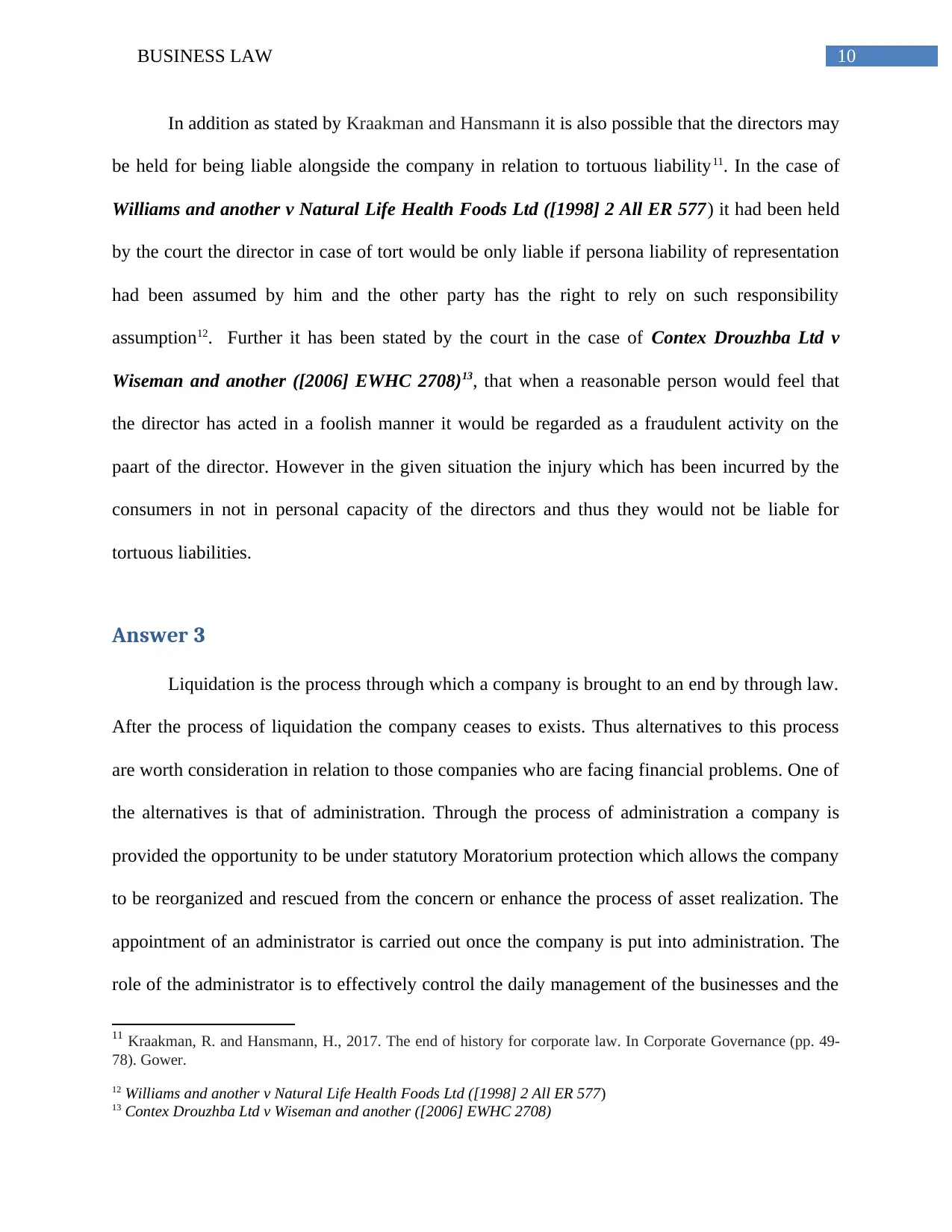
10BUSINESS LAW
In addition as stated by Kraakman and Hansmann it is also possible that the directors may
be held for being liable alongside the company in relation to tortuous liability11. In the case of
Williams and another v Natural Life Health Foods Ltd ([1998] 2 All ER 577) it had been held
by the court the director in case of tort would be only liable if persona liability of representation
had been assumed by him and the other party has the right to rely on such responsibility
assumption12. Further it has been stated by the court in the case of Contex Drouzhba Ltd v
Wiseman and another ([2006] EWHC 2708)13, that when a reasonable person would feel that
the director has acted in a foolish manner it would be regarded as a fraudulent activity on the
paart of the director. However in the given situation the injury which has been incurred by the
consumers in not in personal capacity of the directors and thus they would not be liable for
tortuous liabilities.
Answer 3
Liquidation is the process through which a company is brought to an end by through law.
After the process of liquidation the company ceases to exists. Thus alternatives to this process
are worth consideration in relation to those companies who are facing financial problems. One of
the alternatives is that of administration. Through the process of administration a company is
provided the opportunity to be under statutory Moratorium protection which allows the company
to be reorganized and rescued from the concern or enhance the process of asset realization. The
appointment of an administrator is carried out once the company is put into administration. The
role of the administrator is to effectively control the daily management of the businesses and the
11 Kraakman, R. and Hansmann, H., 2017. The end of history for corporate law. In Corporate Governance (pp. 49-
78). Gower.
12 Williams and another v Natural Life Health Foods Ltd ([1998] 2 All ER 577)
13 Contex Drouzhba Ltd v Wiseman and another ([2006] EWHC 2708)
In addition as stated by Kraakman and Hansmann it is also possible that the directors may
be held for being liable alongside the company in relation to tortuous liability11. In the case of
Williams and another v Natural Life Health Foods Ltd ([1998] 2 All ER 577) it had been held
by the court the director in case of tort would be only liable if persona liability of representation
had been assumed by him and the other party has the right to rely on such responsibility
assumption12. Further it has been stated by the court in the case of Contex Drouzhba Ltd v
Wiseman and another ([2006] EWHC 2708)13, that when a reasonable person would feel that
the director has acted in a foolish manner it would be regarded as a fraudulent activity on the
paart of the director. However in the given situation the injury which has been incurred by the
consumers in not in personal capacity of the directors and thus they would not be liable for
tortuous liabilities.
Answer 3
Liquidation is the process through which a company is brought to an end by through law.
After the process of liquidation the company ceases to exists. Thus alternatives to this process
are worth consideration in relation to those companies who are facing financial problems. One of
the alternatives is that of administration. Through the process of administration a company is
provided the opportunity to be under statutory Moratorium protection which allows the company
to be reorganized and rescued from the concern or enhance the process of asset realization. The
appointment of an administrator is carried out once the company is put into administration. The
role of the administrator is to effectively control the daily management of the businesses and the
11 Kraakman, R. and Hansmann, H., 2017. The end of history for corporate law. In Corporate Governance (pp. 49-
78). Gower.
12 Williams and another v Natural Life Health Foods Ltd ([1998] 2 All ER 577)
13 Contex Drouzhba Ltd v Wiseman and another ([2006] EWHC 2708)
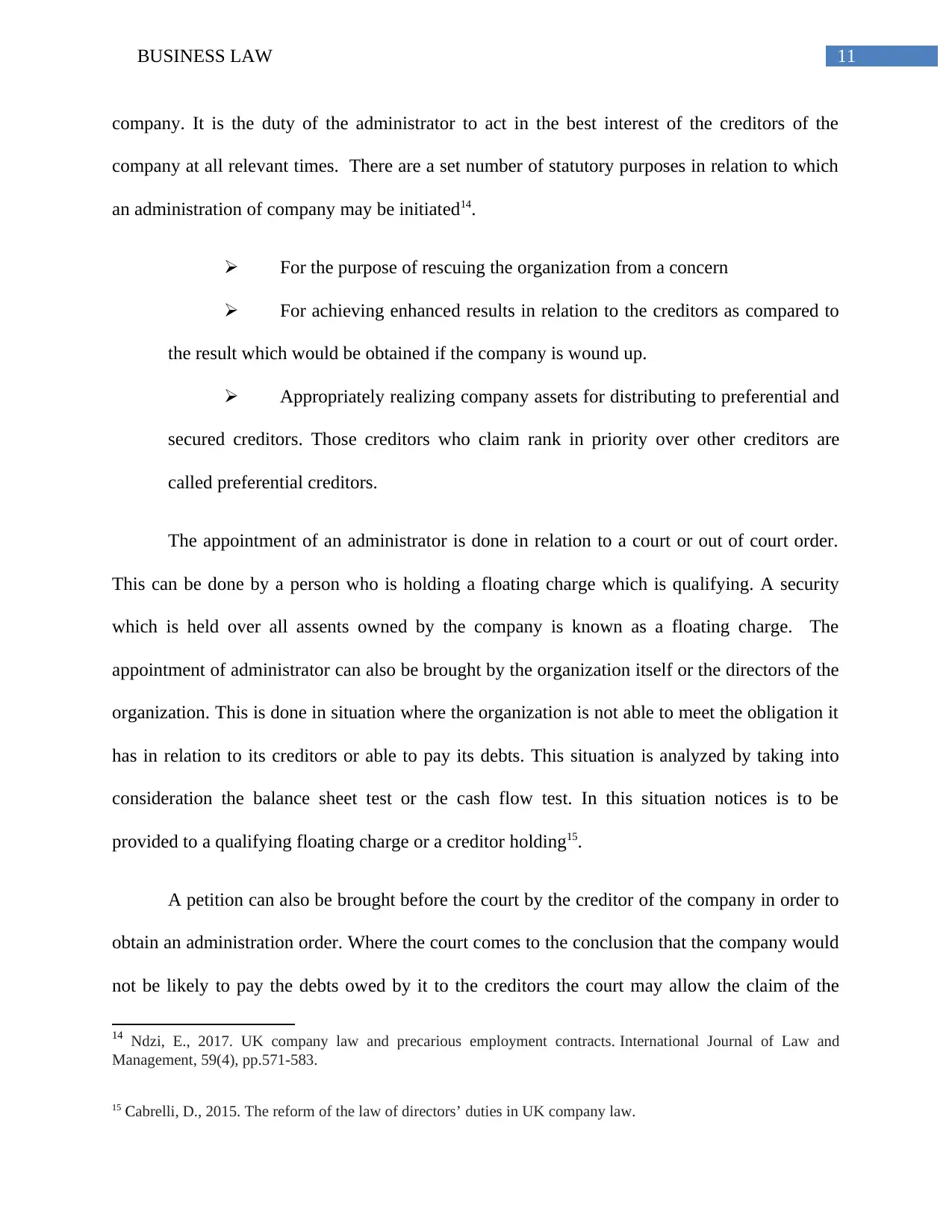
11BUSINESS LAW
company. It is the duty of the administrator to act in the best interest of the creditors of the
company at all relevant times. There are a set number of statutory purposes in relation to which
an administration of company may be initiated14.
For the purpose of rescuing the organization from a concern
For achieving enhanced results in relation to the creditors as compared to
the result which would be obtained if the company is wound up.
Appropriately realizing company assets for distributing to preferential and
secured creditors. Those creditors who claim rank in priority over other creditors are
called preferential creditors.
The appointment of an administrator is done in relation to a court or out of court order.
This can be done by a person who is holding a floating charge which is qualifying. A security
which is held over all assents owned by the company is known as a floating charge. The
appointment of administrator can also be brought by the organization itself or the directors of the
organization. This is done in situation where the organization is not able to meet the obligation it
has in relation to its creditors or able to pay its debts. This situation is analyzed by taking into
consideration the balance sheet test or the cash flow test. In this situation notices is to be
provided to a qualifying floating charge or a creditor holding15.
A petition can also be brought before the court by the creditor of the company in order to
obtain an administration order. Where the court comes to the conclusion that the company would
not be likely to pay the debts owed by it to the creditors the court may allow the claim of the
14 Ndzi, E., 2017. UK company law and precarious employment contracts. International Journal of Law and
Management, 59(4), pp.571-583.
15 Cabrelli, D., 2015. The reform of the law of directors’ duties in UK company law.
company. It is the duty of the administrator to act in the best interest of the creditors of the
company at all relevant times. There are a set number of statutory purposes in relation to which
an administration of company may be initiated14.
For the purpose of rescuing the organization from a concern
For achieving enhanced results in relation to the creditors as compared to
the result which would be obtained if the company is wound up.
Appropriately realizing company assets for distributing to preferential and
secured creditors. Those creditors who claim rank in priority over other creditors are
called preferential creditors.
The appointment of an administrator is done in relation to a court or out of court order.
This can be done by a person who is holding a floating charge which is qualifying. A security
which is held over all assents owned by the company is known as a floating charge. The
appointment of administrator can also be brought by the organization itself or the directors of the
organization. This is done in situation where the organization is not able to meet the obligation it
has in relation to its creditors or able to pay its debts. This situation is analyzed by taking into
consideration the balance sheet test or the cash flow test. In this situation notices is to be
provided to a qualifying floating charge or a creditor holding15.
A petition can also be brought before the court by the creditor of the company in order to
obtain an administration order. Where the court comes to the conclusion that the company would
not be likely to pay the debts owed by it to the creditors the court may allow the claim of the
14 Ndzi, E., 2017. UK company law and precarious employment contracts. International Journal of Law and
Management, 59(4), pp.571-583.
15 Cabrelli, D., 2015. The reform of the law of directors’ duties in UK company law.
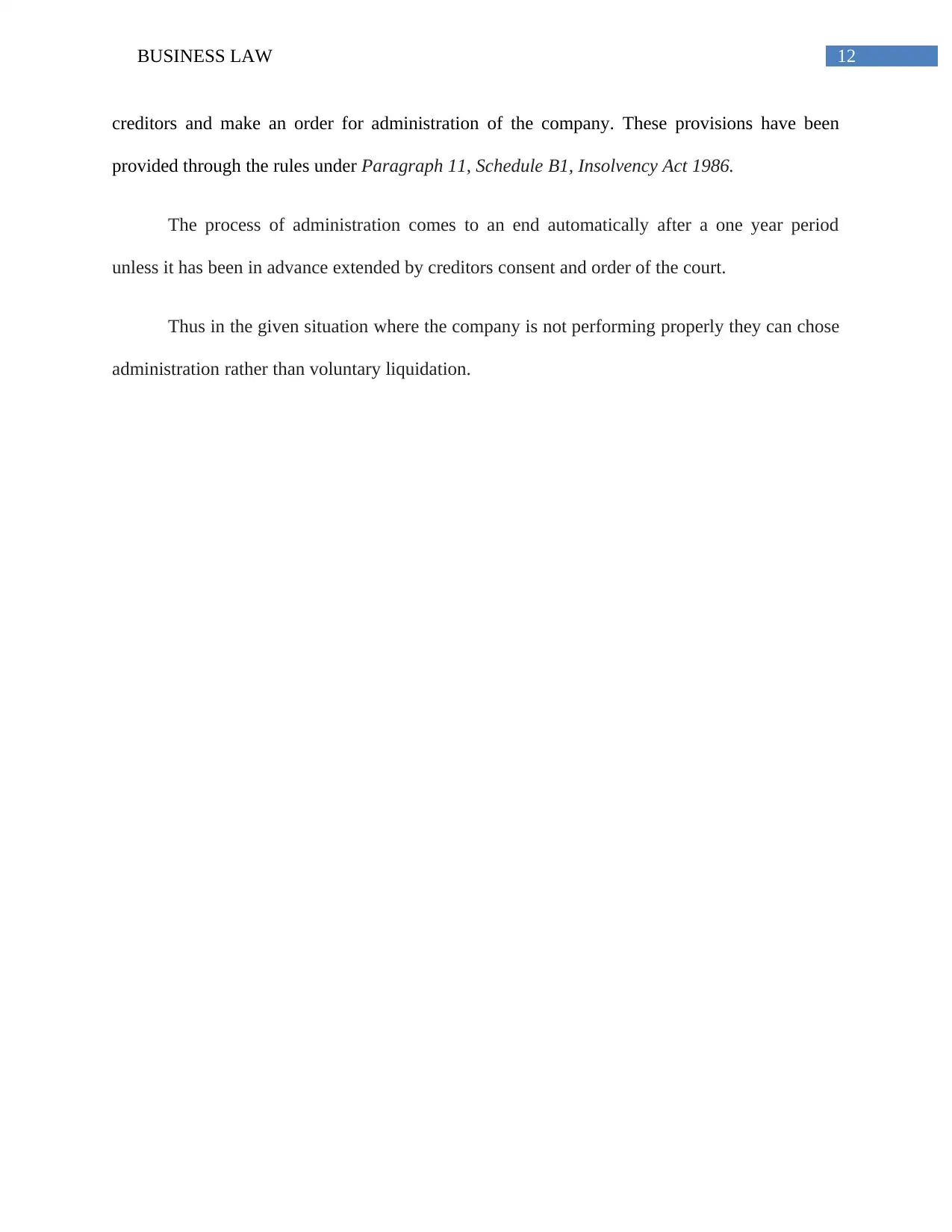
12BUSINESS LAW
creditors and make an order for administration of the company. These provisions have been
provided through the rules under Paragraph 11, Schedule B1, Insolvency Act 1986.
The process of administration comes to an end automatically after a one year period
unless it has been in advance extended by creditors consent and order of the court.
Thus in the given situation where the company is not performing properly they can chose
administration rather than voluntary liquidation.
creditors and make an order for administration of the company. These provisions have been
provided through the rules under Paragraph 11, Schedule B1, Insolvency Act 1986.
The process of administration comes to an end automatically after a one year period
unless it has been in advance extended by creditors consent and order of the court.
Thus in the given situation where the company is not performing properly they can chose
administration rather than voluntary liquidation.
Paraphrase This Document
Need a fresh take? Get an instant paraphrase of this document with our AI Paraphraser
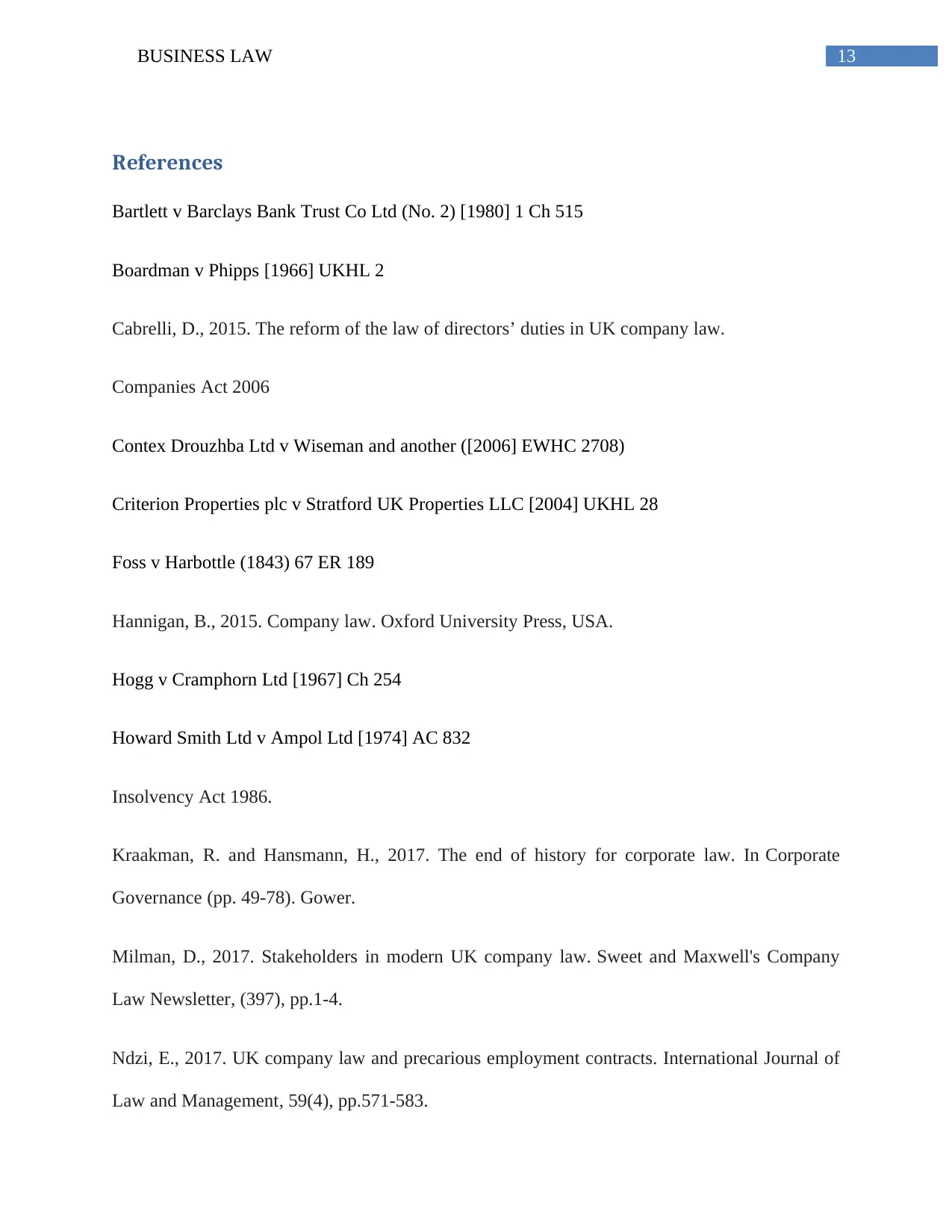
13BUSINESS LAW
References
Bartlett v Barclays Bank Trust Co Ltd (No. 2) [1980] 1 Ch 515
Boardman v Phipps [1966] UKHL 2
Cabrelli, D., 2015. The reform of the law of directors’ duties in UK company law.
Companies Act 2006
Contex Drouzhba Ltd v Wiseman and another ([2006] EWHC 2708)
Criterion Properties plc v Stratford UK Properties LLC [2004] UKHL 28
Foss v Harbottle (1843) 67 ER 189
Hannigan, B., 2015. Company law. Oxford University Press, USA.
Hogg v Cramphorn Ltd [1967] Ch 254
Howard Smith Ltd v Ampol Ltd [1974] AC 832
Insolvency Act 1986.
Kraakman, R. and Hansmann, H., 2017. The end of history for corporate law. In Corporate
Governance (pp. 49-78). Gower.
Milman, D., 2017. Stakeholders in modern UK company law. Sweet and Maxwell's Company
Law Newsletter, (397), pp.1-4.
Ndzi, E., 2017. UK company law and precarious employment contracts. International Journal of
Law and Management, 59(4), pp.571-583.
References
Bartlett v Barclays Bank Trust Co Ltd (No. 2) [1980] 1 Ch 515
Boardman v Phipps [1966] UKHL 2
Cabrelli, D., 2015. The reform of the law of directors’ duties in UK company law.
Companies Act 2006
Contex Drouzhba Ltd v Wiseman and another ([2006] EWHC 2708)
Criterion Properties plc v Stratford UK Properties LLC [2004] UKHL 28
Foss v Harbottle (1843) 67 ER 189
Hannigan, B., 2015. Company law. Oxford University Press, USA.
Hogg v Cramphorn Ltd [1967] Ch 254
Howard Smith Ltd v Ampol Ltd [1974] AC 832
Insolvency Act 1986.
Kraakman, R. and Hansmann, H., 2017. The end of history for corporate law. In Corporate
Governance (pp. 49-78). Gower.
Milman, D., 2017. Stakeholders in modern UK company law. Sweet and Maxwell's Company
Law Newsletter, (397), pp.1-4.
Ndzi, E., 2017. UK company law and precarious employment contracts. International Journal of
Law and Management, 59(4), pp.571-583.
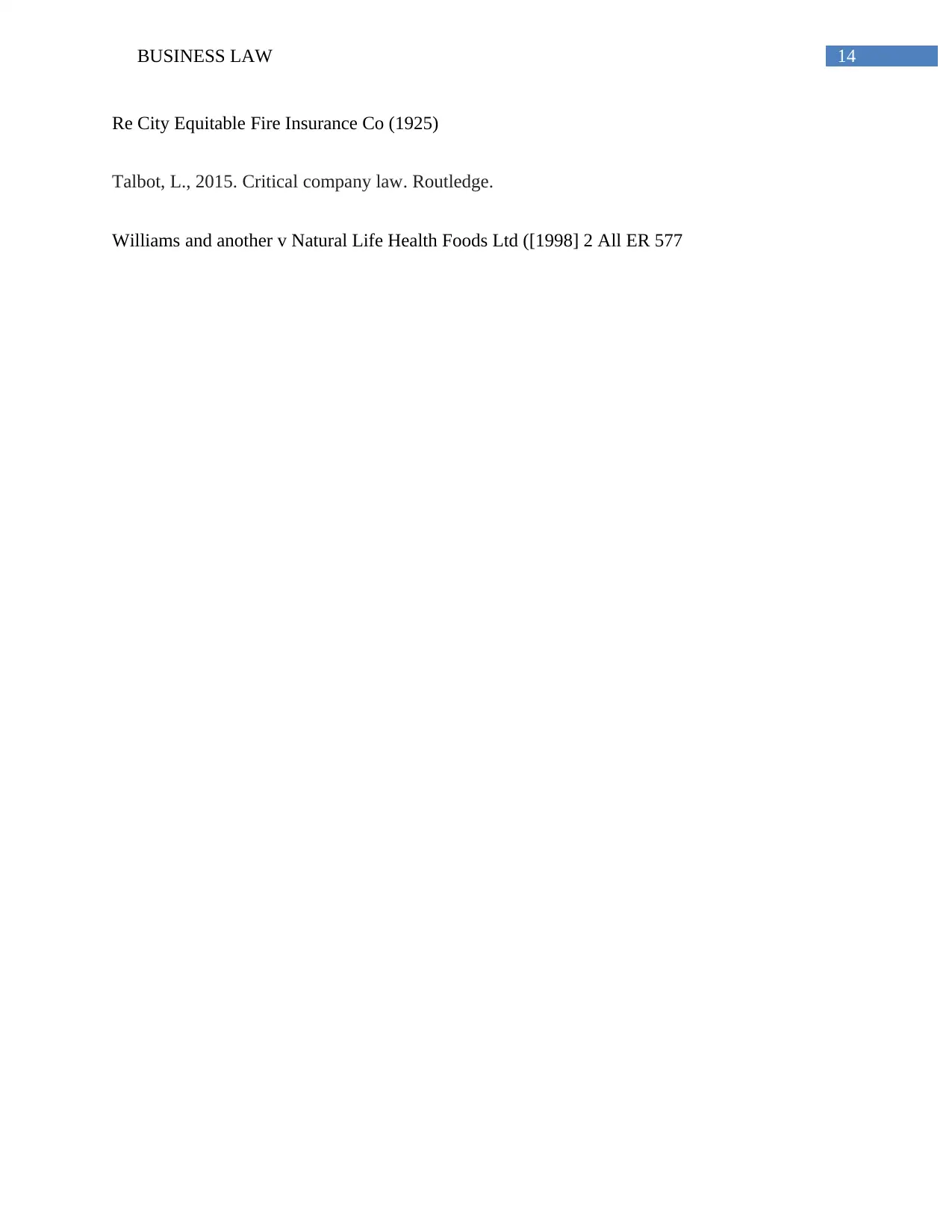
14BUSINESS LAW
Re City Equitable Fire Insurance Co (1925)
Talbot, L., 2015. Critical company law. Routledge.
Williams and another v Natural Life Health Foods Ltd ([1998] 2 All ER 577
Re City Equitable Fire Insurance Co (1925)
Talbot, L., 2015. Critical company law. Routledge.
Williams and another v Natural Life Health Foods Ltd ([1998] 2 All ER 577
1 out of 15
Related Documents
Your All-in-One AI-Powered Toolkit for Academic Success.
+13062052269
info@desklib.com
Available 24*7 on WhatsApp / Email
![[object Object]](/_next/static/media/star-bottom.7253800d.svg)
Unlock your academic potential
© 2024 | Zucol Services PVT LTD | All rights reserved.





